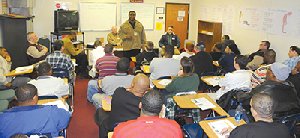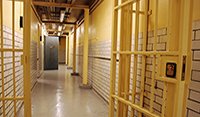Men just released from state prisons in Huntsville, Texas, arrived by bus in Fort Worth and gathered at the Tarrant County Probation Office. But before they re-entered the free world, they heard straight talk from someone who understood what they faced.

Paul Owens, education coordinator for Welcome Back/Tarrant County, a faith-based re-entry program for ex-offenders, talks to a group of recently released prisoners.
|
“You’re going to have to deal with some attitudes. You need to take your pride and put it aside. You don’t have it all together. That’s why you’re sitting here. Take it from a four-time loser,” said Paul Owens, education coordinator for Welcome Back/Tarrant County, a faith-based re-entry program for ex-offenders.
The men in the small room in South Fort Worth are among the 60 new parolees a week who attend re-entry orientation programs there each week, said Dalonika McDonald, unit supervisor for the Fort Worth District Re-entry Center.
Successful transition from life in prison to life in free society depends on three factors, Owens told the parolees—a support group, education and a job.
“The good news is you can make a change in your life,” he said. “You don’t have to go back.”
 |
A bleak picture
But national statistics predict many will return to prison. Nationally, about 650,000 people are released from prison annually, according to the Reentry Policy Council, a project of the Council of State Governments Justice Center. Two-thirds of state prisoners are rearrested within three years of release.
“Research shows that when people who are released from prison or jail return to the community, their job prospects are generally dim, their chances of finding their own place to live are bleak, and their health is typically poor,” the council’s website states.
The council notes:
• Three of four offenders released from prisons have a substance abuse problem. Only 10 percent in state prisons received treatment during incarceration.
• More than one of three reports some physical or mental disability.
• More than half — 55 percent —have at least one child under age 18 who depends on the ex-offender for fi-nancial support.
• Only one-third participated in educational programs in prison, and barely more than one-fourth (27 percent) received vocational training.
Seeing lives transformed
Faith-based re-entry programs like Welcome Back/Tarrant County are committed to keeping ex-offenders from returning to prison and seeing lives transformed by the gospel, said Chaplain Jerry Cabluck, who leads the ministry.
The first 72 hours after an ex-offender is paroled often determines whether he or she re-enters society successfully or ultimately returns to prison, he noted.
“When an incarcerated person is released, the first thing that happens is they encounter prostitutes, alcohol, drugs—sin and temptation right in front of them,” Cabluck said. “The Lord’s calling on my heart is to help ex-offenders learn basic life skills and provide a support network to help them resist the temptation to fall back into old self-defeating lifestyles.”
A person who has been incarcerated for an ex-tended time often returns to an urban area, without a driver’s license, with no knowledge of public transportation and with no idea where to find a job, he noted.
Welcome Back/Tarrant County provides newly paroled ex-offenders food, clothing and access to other services, such as health care and job-readiness training. The ministry seeks to connect the parolees with a church and mentors, as well as helping them pursue educational opportunities and find a job. The program places men and women in entry-level jobs, and at least 19 have enrolled in community college.
In many ways, four-time-offender Owens is typical of the workforce Welcome Back/Tarrant County depends on, Cabluck said.
“We’re a green ministry. We recycle lives,” Cabluck said.
Ex-offenders relate well to other ex-offenders who know something about their life experiences.
Bridging two worlds
Pastor Sie Davis understands life behind bars, life on the streets and how to bridge the two worlds. “I was born in prison and born again in prison,” said Davis, a church planter who leads a residential ministry in Dallas to help ex-offenders make the transition to life in the free world.
His mother, who struggled with drug addiction, was incarcerated in the Goree State Farm for Women near Huntsville when she gave birth to her son in 1955.
“They didn’t know what to do with me. I was in the prison nursery nearly three months before my aunt came to get me,” he said. “I tell people I was the youngest parolee in the state of Texas.”
But it marked neither his final release nor his last time in prison.
“I spent most of my life on the streets of South Dallas and 17 and one-half years in prison. It was on the installment plan. I was in prison four times,” he said. On the streets, he worked for his stepfather — Chicago Red, an organized crime figure known as “the Godfather of South Dallas.” On two occasions when he was imprisoned, he shared a cell with his biological father, who was doing time for drug-related charges, pimping and pandering.
During one of his periods of incarceration, Davis made a profession of faith in Christ. After his conversion, several prominent leaders in prison ministry helped mentor and disciple him. Even so, within six months after his release, he returned to prison on a drug charge.
Christian life in the free world
Many ex-offenders find living as a Christian in the free world after release more difficult, in many respects, than living as a Christian in prison, Davis said.
“People say, ‘Church is church.’ Church ain’t just church. It’s different in prison than it is out here,” he said.
African-Americans, Hispanics and Anglos worship alongside each other in prison — a rarity in the free world, he noted. Practices common in most churches — such as passing the plate to collect an offering — are foreign to men and women whose first worship experiences are in prison chapels.
Furthermore, offenders who first become acquainted with free-world churches through prison ministry volunteers may develop an unrealistic expectation of what it means to live as a Christian outside prison.
“They put on a show like they’re always happy, get along with everybody and have no problems. Come out, and you see they have struggles like everybody. There’s a lot of illusion that’s taken as fact,” Davis said.
Making the transition
Ex-offenders need help with employment, transportation and other services. But mostly, Davis said, they need help making the mental transition to life outside a penal institution.
“There’s a transition in the mind when a person goes into prison—moving from this big old world to go live in a little cell and never go more than two or three miles for years at a time,” he said.
Likewise, release demands mental transition. He recalled one ex-offender who constantly had to be reminded after release to zip his trousers.
“There are no zippers on prison uniforms,” he explained. “Things we take for granted, they don’t understand.”
In the last decade, Davis has devoted his life to helping ex-offenders. He directs the statewide Crossroads Unwinding ministry and its 12-step substance-abuse-recovery “Overcomers” program. He leads a residential program for recently released ex-convicts, with a location for men in South Dallas and a women’s facility in the Pleasant Grove area of Dallas.
He is pastor of the Church of the Called Out Ones, and is a church-planting consultant who helps start other congregations for ex-offenders. He also preaches in prisons around the state, sharing his testimony and seeking to prepare prisoners for life outside penal institutions.
Davis believes ex-offenders need to worship with other ex-offenders in the crucial months immediately after their release, but he also hopes mature Christians from traditional churches will serve as mentors to spend time with newly released prisoners, listen to them and help them grow spiritually.
“It’s tough. Ex-offenders have to behave over and above everybody else. They have to strive a little harder than anybody else. They come out filled with fear. They know a lot is coming against them,” he said.
“At the same time, the church has fear. We have to teach churches how to accept ex-offenders. …We need to educate the church. There’s a mission field right here — people who are getting out of prison every day.”
Ken Camp is managing editor of the Baptist Standard.
